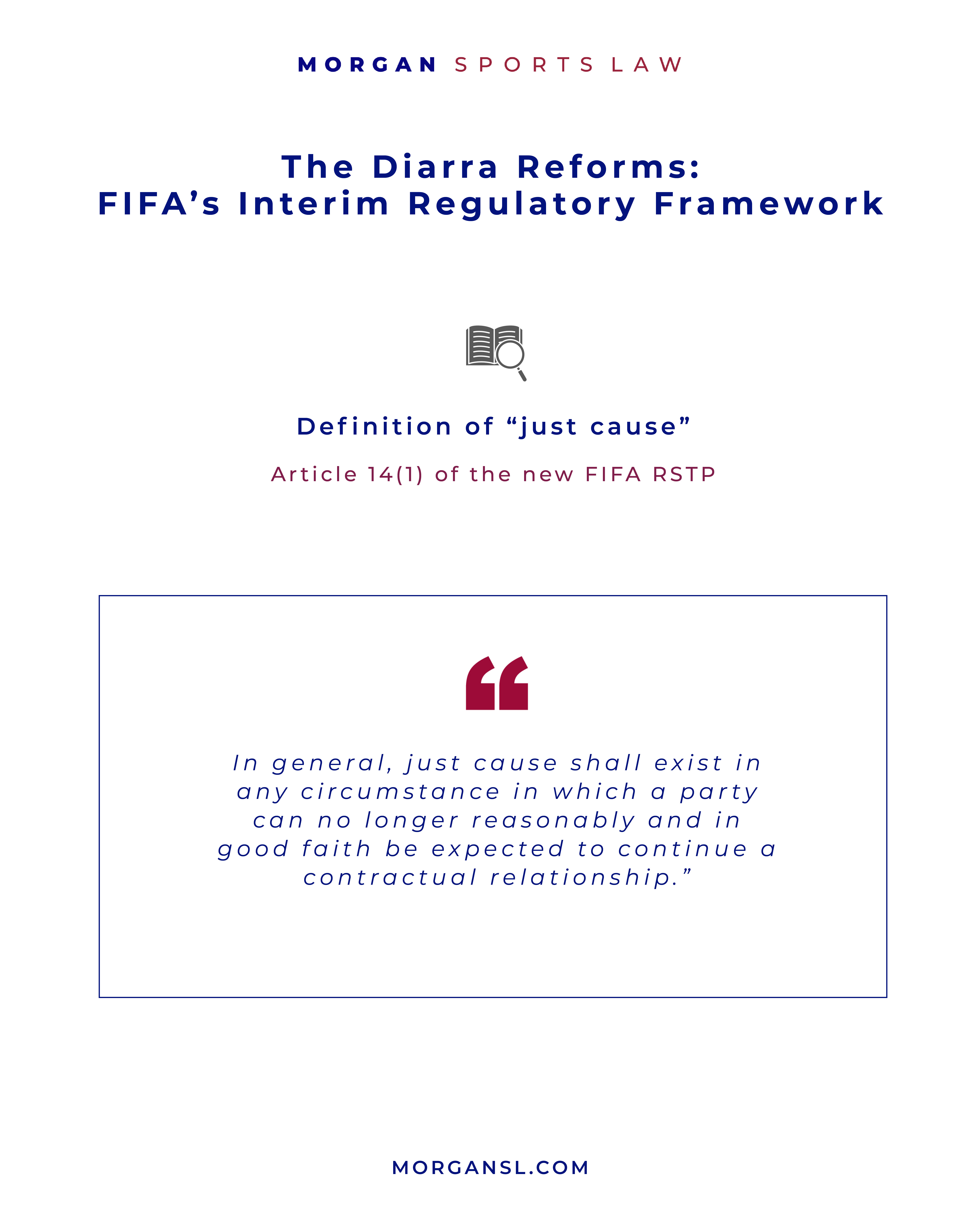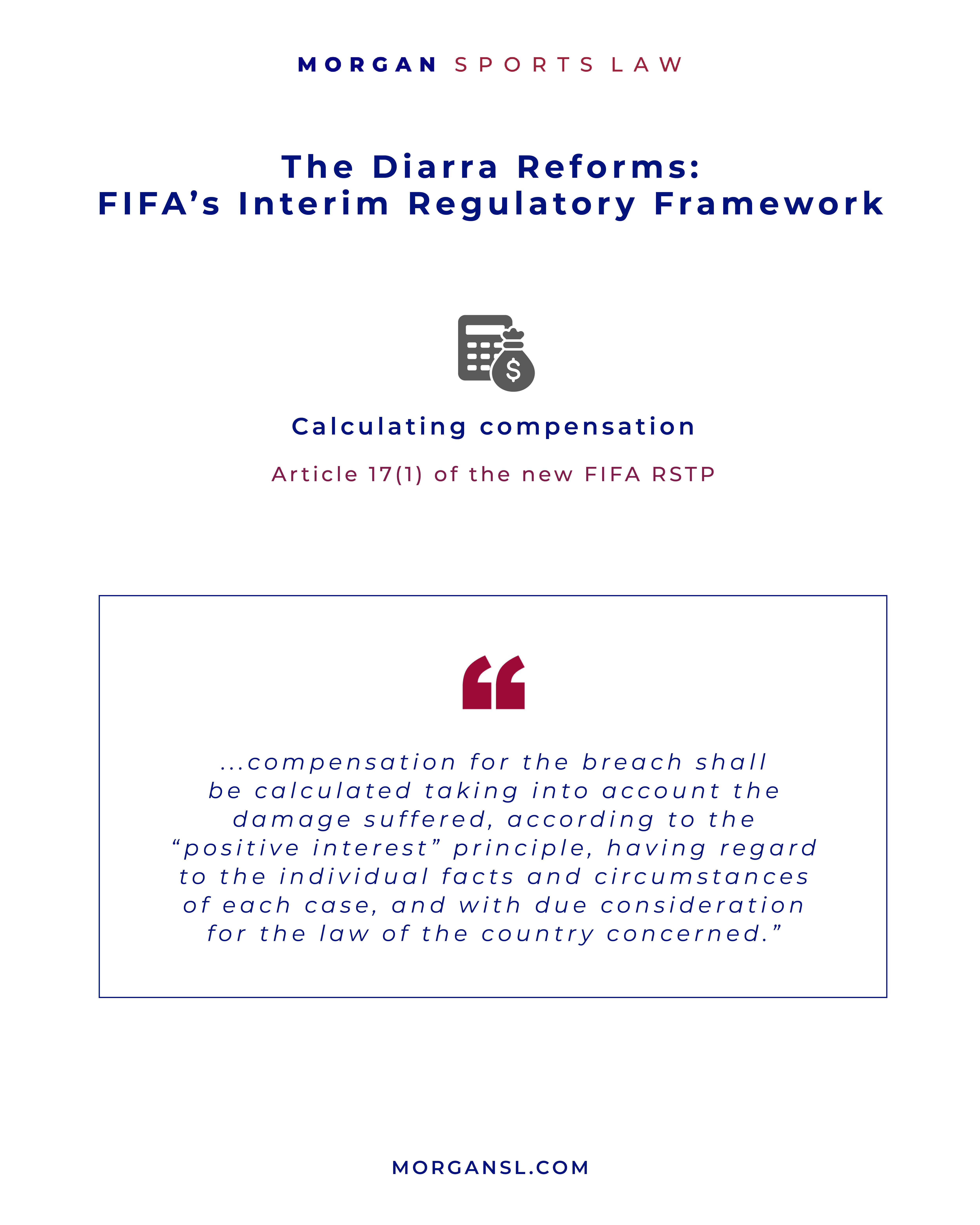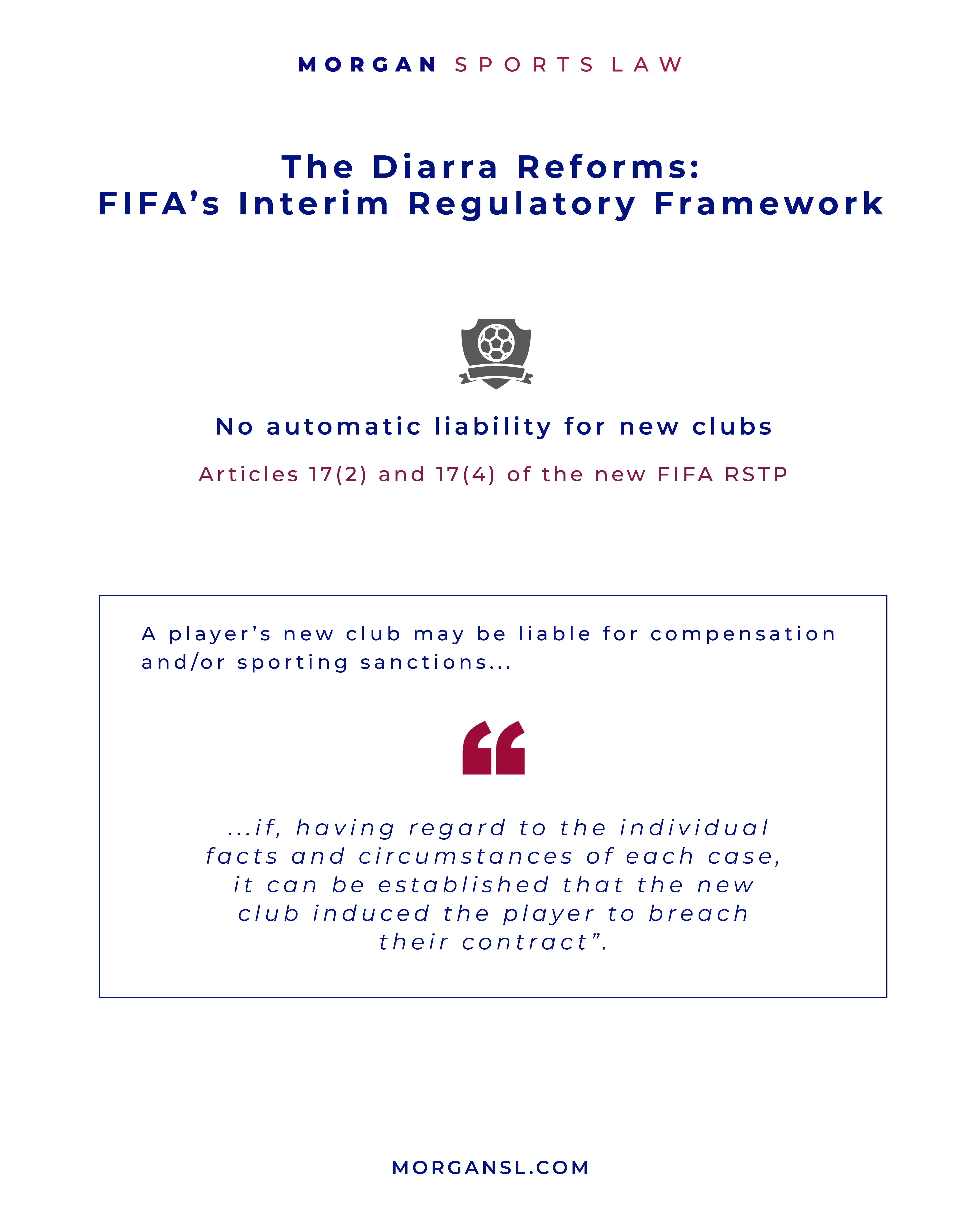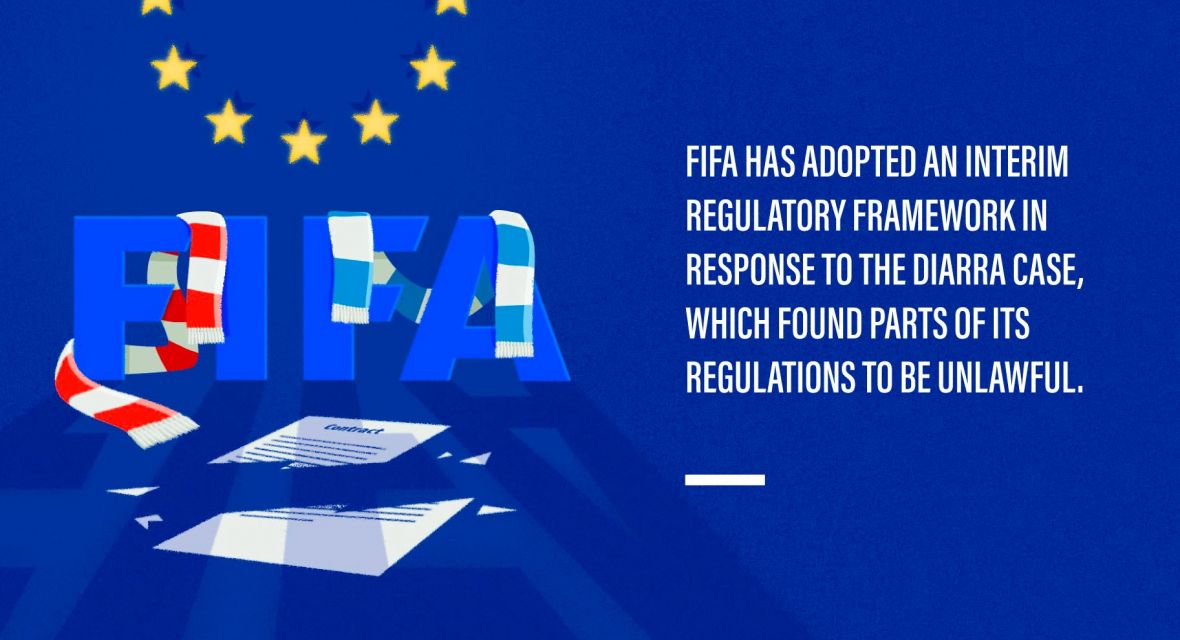The Diarra Reforms: FIFA’s Interim Regulatory Framework
Following the ground-breaking judgment of the Court of Justice of the European Union (“CJEU”) in the Diarra case in October 2024 – which we considered in our earlier article, Diarra vs FIFA’s RSTP – Bosman 2.0? – FIFA has adopted an interim regulatory framework to address the aspects of its regulations which were found to be unlawful.
This interim regulatory framework, which took effect on 1 January 2025, is explained below.
Diarra
By way of brief re-cap, in Diarra, the CJEU ruled that the following provisions of the then-applicable FIFA Regulations on the Status and Transfer of Players (“FIFA RSTP”) were unlawful:
- Article 17(2) – which provided that, where a player had been found to have terminated his contract with his former club without just cause, the player and his new club would be jointly and severally liable for the payment of any compensation owed by the player to his former club (calculated in accordance with Article 17(1) of the FIFA RSTP);
- Article 17(4) – which provided that the new club would be presumed to have induced a breach of contract where they signed a player who had terminated his previous contract without just cause during the “protected period” (two or three years from the start of the player’s contract with his former club, depending on the player’s age) and that sporting sanctions (i.e., a registration ban) would then be imposed on the new club.
- Article 9(1) and Annex 3 – which provided that, in case of the transfer of a player between clubs affiliated to different national associations, the International Transfer Certificate (“ITC”) that the national association of the new club needs to obtain from the national association of the former club in order for the player’s registration to be lawfully transferred would not be provided whilst a contractual dispute between the player and his former club was ongoing.
Each of these provisions (including the relevant part of Article 17(1) of the FIFA RSTP) were found to violate players’ free movement rights under EU law, and competition law.
The Diarra ruling therefore left significant holes in the FIFA RSTP.
FIFA has moved quickly to fill those holes by implementing its interim regulatory framework, pending the conclusion of its global consultation process on the future of the FIFA RSTP.
Interim Regulatory Framework
The interim regulatory framework aims to address the three key infringements identified in the FIFA RSTP in Diarra: (i) the calculation of compensation due by a player to his former club for breaching their contract without just cause, (ii) the automatic liability of a player’s new club following termination without just cause by the player (for compensation and/or sporting sanctions), and (iii) the possibility of withholding the ITC pending resolution of a contractual dispute.
Definition of “just cause”
As a preliminary matter, however, the interim regulatory framework also inserts the following definition of “just cause” into Article 14(1) of the new FIFA RSTP (emphasis added):
In general, just cause shall exist in any circumstance in which a party can no longer reasonably and in good faith be expected to continue a contractual relationship.
This definition – which responds to the CJEU’s criticism, at para. 105 of its judgment, that the term was “not precisely defined in the regulations” – codifies established jurisprudence of the FIFA Football Tribunal and the Court of Arbitration for Sport (“CAS”) and, thus, does not constitute a significant change, but it does add welcome clarity and predictability.

Calculating compensation
As regards the calculation of compensation, the problematic references to vague notions of “the specificity of sport” and to irrelevant factors such as “fees and expenses paid or incurred by the former club” in Article 17(1) of the new FIFA RSTP have been removed and are replaced as follows:
compensation for the breach shall be calculated taking into account the damage suffered, according to the “positive interest” principle, having regard to the individual facts and circumstances of each case, and with due consideration for the law of the country concerned.
This amendment aims to address the reasoning of the CJEU in Diarra which averred that the general principle of contract law, that damages should put the innocent party in the position they would have been in had the contract been properly performed, should apply. This should, hopefully, bring some clarity to an issue which has long been unsatisfactory (as we have discussed previously here).
However, the amendment seems to codify the approach already applied by the CAS and will not eliminate the existing discrepancy between the calculation of compensation owed by a club to a player (which is predictable, since it is calculated on the basis of a clear formula), and the calculation of compensation owed by a player to a club (which is not). Given the CJEU’s requirement for criteria to be predictable, it is at least questionable as to whether the amendments to Article 17(1) go far enough.
Equally, it remains to be seen whether the interim regulatory framework goes far enough, in particular given the requirement merely to give “due consideration for the law of the country concerned” (emphasis added).
In Diarra, the court noted that “the possibility that ‘the law of the country concerned’ will be taken into account, does not guarantee actual observance of that law” and that “in reality [this] criterion has virtually never been applied in practice”. The CJEU considered, at para. 106 of its judgment, that:
Such a failure to actually take into account and therefore to actually comply with the law in force in the country concerned clearly goes beyond what may be necessary in order to maintain a certain degree of stability in clubs’ player rosters with a view to ensuring the regularity of interclub football competitions.
This is, thus, an issue which will likely require further thought, in order to ensure that national law is given full effect where appropriate, whilst also recognising the aim of the FIFA RSTP to facilitate cross-border dispute resolution.

No automatic liability for new clubs
The next significant change in the interim regulatory framework is the elimination of the presumption that a player’s new club had induced a breach of contract, where that player had terminated their previous contract without just cause during the protected period, and the resulting automatic liability for the new club (for both compensation and sporting sanctions).
Again following the guidance of the CJEU in reverting to general principles of contract law, the interim regulatory framework provides (in Articles 17(2) and 17(4) of the new FIFA RSTP) that a player’s new club may be liable for compensation and/or sporting sanctions “if, having regard to the individual facts and circumstances of each case, it can be established that the new club induced the player to breach their contract”.
A further (possibly inadvertent) change to Article 17(2) of the new FIFA RSTP is that, if a new club is found to have induced a breach of contract, the new club will be “jointly liable” with the player, rather than “jointly and severally liable”, as was the case under the old regulations.
Whilst the FIFA explanatory notes on the interim regulatory framework refer only to “joint and several liability”, which may suggest that the omission of the words “and severally” from the new Article 17(2) was not deliberate, it remains to be seen how this provision will be interpreted. Of course, joint liability is not the same as joint and several liability and, thus, the use of the term “jointly liable” instead of “jointly and severally liable” may have consequences – for example, the Football Tribunal may require claimant clubs to sue both the new club and the player (jointly), in order to obtain any compensation from the new club.
Nevertheless, in order to assist parties seeking to establish that a new club has induced a breach of contract, the interim regulatory framework also introduces a new disclosure obligation into Article 13(6) of the Football Tribunal’s Procedural Rules, which now provides that:
Parties have the duty to collaborate to establish the facts and shall respond in good faith to any evidentiary request from a chamber, the FIFA general secretariat or a party. A party submitting an evidentiary request shall demonstrate that the evidence requested is likely to exist and is relevant. An adverse inference may be drawn from a party’s reaction to an evidentiary request
This seems to be a sensible addition, although one would expect the Football Tribunal only to order the disclosure of evidence which is in the possession and/or control of the relevant party, in accordance with generally accepted principles of disclosure, notwithstanding that the new Article 13(6) of the Procedural Rules is not expressly so limited.

ITC cannot be withheld
Lastly, the provisions of Annex 3 of the new FIFA RSTP have been amended to ensure that ITCs will be issued notwithstanding any contractual dispute between a player and their former club.
Whilst the interim regulatory framework largely codifies existing FIFA practice in this respect, the new FIFA RSTP expressly states, at Article 11(6) to Annex 3, that “the issuance of an ITC is without prejudice to any contractual dispute between the player, their former club and/or their new club”, which brings welcome clarity.
It is no longer possible for a national association to reject a request for an ITC and, if the national association of a player’s former club fails to respond to a request for an ITC within 72 hours, the new association will be able to register the player with the new club regardless.
Pending cases
FIFA has recognised the issue identified in our earlier article, that the rules affected by the Diarra decision will be applicable to many cases which are currently pending before the Football Tribunal.
Article 29 of the new FIFA RSTP provides that the interim regulatory framework “shall apply to cases pending before the Football Tribunal” with immediate effect from 1 January 2025.
The explanatory notes to the interim regulatory framework also provide, at para. 59, that “before the Football Tribunal renders any decision, the parties concerned will be granted the right to be heard in relation to the possible consequences and impact of the interim regulatory framework on the merits of a case”.
One would expect the same approach to be adopted in any pending appeals before the CAS, including in cases where the appeal has already been heard but an award is yet to be rendered.
Authored by
Omar Ongaro
Special Counsel
Ben Cisneros
Associate


